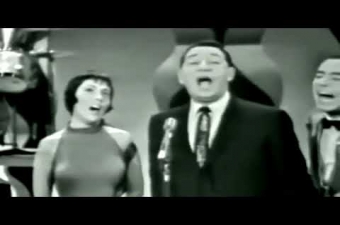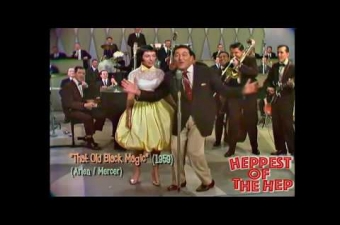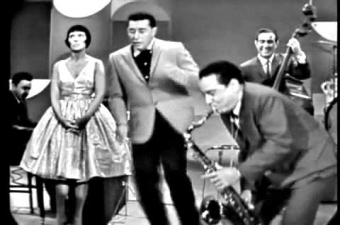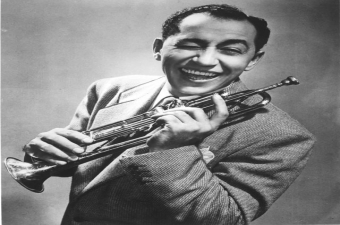Louis Prima’s Birthplace
1812 St. PeterNew Orleans LA 70116
The beloved bandleader Louis Prima was born here, just off North Claiborne Avenue, in 1910. At the time, Sicilians like the Primas and other white immigrants lived alongside Creoles of color and African Americans in Treme. As a child, Prima studied the music and performance styles of his Black neighbors: spasm bands on street corners, dance bands playing on the backs of trucks to advertise their gigs, spirituals emanating from churches, and brass bands marching in and out of St. Louis Cemetery No. 2. He came to idolize Louis Armstrong, who was ten years Prima’s senior and grew up about a mile away.
Prima led his first band at Jesuit High School and, at 19, landed a gig in the orchestra at the Saenger Theater. In addition to playing trumpet, Prima, a natural showman, started acting in comedy skits. To get laughs on some gigs he hired a Black six-year-old from Treme named Earl Palmer to tug on his jacket between songs and say “Daddy, Mama wants you on the telephone.” Prima feigned embarrassment, slipped him some money, and stage-whispered “Here, kid, take this and beat it.” Palmer went on to anchor the J&M Studio house band and become one of the most influential drummers in popular music.
One night in 1934, bandleader Guy Lombardo heard Prima’s horn from outside of a club on Bourbon Street and recruited him to play in New York. Prima became a sensation at the Famous Door on 52nd Street (not to be confused with the Famous Door that later opened on Bourbon). From there he moved to Hollywood, and spent the rest of the decade playing to packed theaters across the country. He recorded and composed along the way—his tune “Sing, Sing, Sing,” popularized by Benny Goodman, became a jazz standard.
When the market for big bands declined after World War II, Prima adapted his act and found new collaborators. The first was Keely Smith, a young singer who became Prima’s fourth wife–they worked on fresh material at the Sho-Bar in the French Quarter, among other places. The second, saxophonist Sam Butera, came thanks to Louis’ brother Leon. He booked Butera at his club on Bourbon Street, where he’d been playing behind strip-tease acts since he was 14. Prima tapped him to lead a band—the Witnesses—to back him in a residency at a Las Vegas casino.
The resulting stage show, with the rascally Prima playing off of Smith’s deadpan, became a national phenomenon. Biographer Garry Boulard notes that Prima’s wildness on stage and the driving rhythm of Butera’s band led some critics to consider them a rock ‘n’ roll act (though much of their audience would have blanched at the thought). Prima’s New Orleans sensibility never left him: he ended every show by parading into the crowd with the band, playing “When The Saints Go Marching In.” A number of hit records followed, including the single “Just a Gigolo/I Ain’t Got Nobody” arranged by Butera, and Prima and Smith’s duet “Old Black Magic.”
In the 1960s Prima’s brand of showmanship fell out of fashion, and his acrimonious divorce from Smith threw some fans for a loop. He got a boost in 1968 when Disney made him the voice of King Louie the orangutan in “The Jungle Book.” After four decades in the spotlight, from vaudeville stages to television screens, Prima moved home to New Orleans in the 1970s. His tomb in nearby Jefferson Parish is inscribed with lyrics from his signature song: “When the end comes I know they’ll say ‘Just a gigolo’ as life goes on without me.”
For more about North Claiborne Avenue, click here.
For more about the Treme neighborhood, click here.
Videos

From 1959, after making it big in Las Vegas, Louis Prima with Keely Smith and Sam Butera perform "Just A Gigolo - I Ain't Got Nobody."
Video from Attila F..
From 1959, after making it big in Las Vegas, Louis Prima with Keely Smith and Sam Butera perform "Just A Gigolo - I Ain't Got Nobody."

Prima and Smith perform "That Old Black Magic" in 1959.

Sam Butera plays his slow-burning version of "Night Train" while Prima wilds out and Smith looks on.
Video posted by mrdantefontana666.
Sam Butera plays his slow-burning version of "Night Train" while Prima wilds out and Smith looks on.

WWOZ Tricentennial Music Moment: Sheik of Araby--the story of Prima tempting the censors at Capitol Records.
Video by WWOZ.
WWOZ Tricentennial Music Moment: Sheik of Araby--the story of Prima tempting the censors at Capitol Records.
Images
















